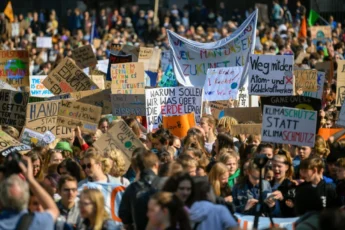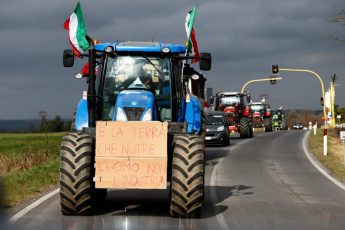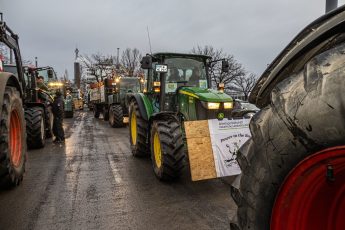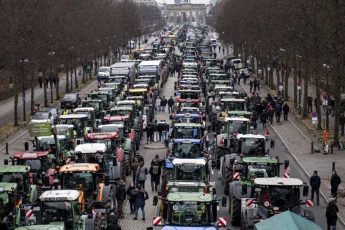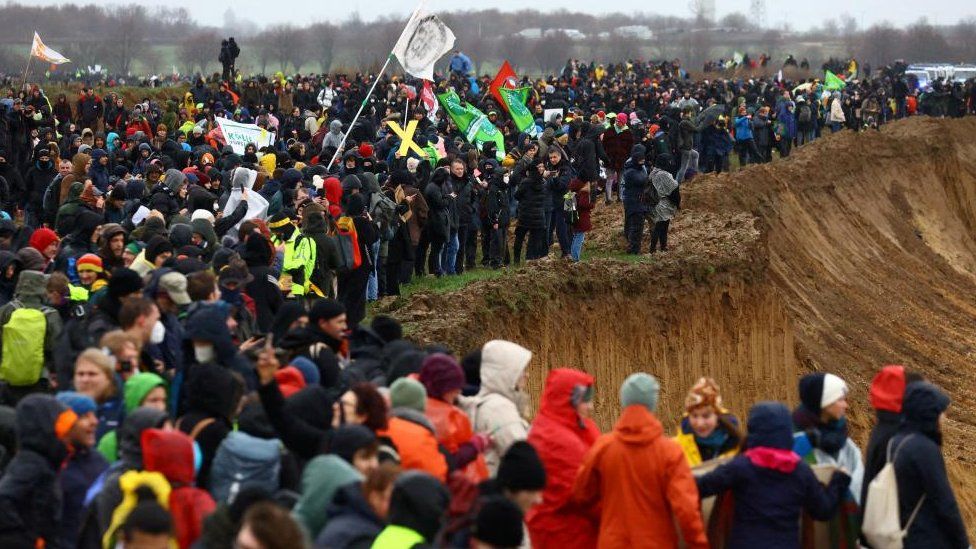
by CLIMATE CLASS CONFLICT
We made an interview with Indigo, an activist from Lützerath Lebt, the collective that since two years has been fighting the plan of the German government and RWE (a multinational energy company) to expand the coalmine of Lützerath, in the North-Rhine Westphalia region. The interview highlights some of the most pressing demands climate activists have to face right now: the problem of organization and civil disobedience, the nationalist rhetoric fostered by the war in Ukraine, the connection with social struggles. The case of Lützerath is revealing of some current political trends, and inspiring for the strength the climate justice movement has gained. After the destruction of the village started, more and more activists for climate justice joined their forces to say no to this massive plan of destruction and to the extraction of more fossil fuel. For many in the climate justice movement, the struggle in Lützerath was the moment where they realized that, as Indigo puts is, “we cannot rely on any government in capitalism in order to save our climate, but that we have to act ourselves”. The demonstrations and civil disobedience of the activists have played an important role for the world to see that an opposition to fossil capitalism is possible. At the same time, that wasn’t enough. In order to win our fight, «we have to also organize where the production takes place», to strike «where capitalism is being made». The war in Ukraine has made the struggle in Lützerath even harder, because it provided the excuse for the Green Party to speed up the industrial plan and the police repression. More in general, the war has changed the “climate of society”, not just by reshaping the priorities of the German government, but also by fostering nationalism. The tensions and contradictions between climate struggles and wokers’ struggles are also part of the difficulties in organizing the fight for a systemic change. As the German industrial sector is still much dependent on fossil fuels (see also the article from Interventionist Left in the first issue of our Climate Class Conflict journal), a movement demanding a real change still needs to disentangle the issue on how to build a common struggle with workers and to go beyond a system based on the exploitation of labour. Finally, the struggle in Lützerath was the occasion to build connections with climate struggles elsewhere, by recognizing the similarities and connections among different struggles. Still, solidarity won’t be enough, as a transnational organisation is what we need, and our most urgent present challenge. Therefore, these issues will be central questions during our next transnational meeting in Frankfurt, 10-12 February.
CLIMAT CLASS CONFLICT: Can you tell us briefly what happened in Lützerath in the last months and what’s the situation now?
INDIGO: We occupied the village of Lützerath two and a half years ago because it is next to the biggest source of CO2 in Europe, the coalmine area of RWE and it was to be destroyed for this mine to grow. We started to live there and organize the resistance against this destruction. We got evicted last week. The federal government, that right now also includes the Green Party, decided to destroy the village of Lützerath in order to get to the coal underneath it. The destruction that we saw here was very hard for us, but at the same time, it was so amazing to see all the solidarity from all over the globe, and we were really amazed that we managed to mobilize so many people. On Saturday, one week ago, we had a demonstration with 35,000 people and we are in the middle of nowhere. So it’s really harder for people to get here than if you were in a big city. And the best thing was that it was not just a demo, but people started civil disobedience in masses with thousands and thousands of people that tried to get out of the demonstration and enter to the village of Lützerath, where the eviction was still taking place at this time. They didn’t manage to go through in the end, and people experienced police violence there. But what people could really experience there was that we cannot rely on any government in capitalism in order to save our climate, but that we have to act ourselves. And there were a lot of people who were in action for the first time in their lives, and that was a really huge success. The other huge success was that different parts of the climate justice movement came together to fight here for that. That was cool because usually there’s a lot of separation between different groups and the climate movement in Germany.
Which forms of collective actions did activists put in place in the past weeks? What did we learn about organizing climate struggles against fossil capitalism? Which difficulties did you have to face, and what could be improved?
We had different actions here: civil disobedience with thousands of people, the occupation of this village, and more militant actions against the attack of the police. What we could learn is how strong we are, if we stick together, and also that it makes sense to have one really concrete struggle. We don’t want this mine to continue, we want to stop it here, but at the same time we always point out that this is not only about this village, but about overcoming neo-colonial capitalism, and that we try to organize in a feminist way and not to give patriarchy any ground in your own organizations. That was an important lesson from the struggle. And this worked really well here. The difficulty that we experienced in the end was that we were successful in organizing, we had a lot of people making great, very brave actions. But at the same time we didn’t succeed. And I think in this point you can see several things. The first thing is that we cannot set any hope on governments under capitalism, and that demonstrations and even civil disobedience will not be enough to challenge the system. But we have to also organize where the production takes place, because that’s the place where capitalism is being made, and for this we have to organize with the people in production. I think that was what we learned.
The German government’s plan to extend the coal mine was already in the air, but it seems that the war in Ukraine has made it ‘easier’, or maybe more urgent, to pursue this plan. Sure enough, the war gave some ideological coverage to use more fossil fuels and exacerbate the repression against activists. Do you think the war has had some effect on the clearing of the Lutzerath camp? Which are the positions on the war inside the ecologist movement?
The plans to expand to some extent this mine were already made before the war in Ukraine. But now plans are made by the Green Party in the government. When they joined the government, they actually decided to extend the mine. Therefore, for this they used the excuse of the war in Ukraine. They said they need this energy because of the war in Ukraine, which is a lie because they cannot burn the coal before the next two years. This was simply a lie, but they used it and that was much easier for them because they could say « we are the climate protecting party, but this is a crisis, this is war. And because of this, we need to make things that we actually don’t agree on». That had some impacts on the eviction, because the whole climate in society was much more like «okay, we are in a crisis, we are in a war, we need to trust our governments». Also nationalism has grown bigger since the war started. But in the camp and in the ecological movement, we don’t have a shared position on the war in the Ukraine.
Activists for climate struggle often have to face the dire alternative between fighting for better environmental conditions and fighting for better working and social conditions. Those demanding a real system change are using the slogan “End of the world, end of the month: same struggle”, which refuses this alternative. How have you dealt with that in the struggle in Lützerath? Who took part to the protest, and what’s the relation between climate activists and workers?
First, I think you can’t distinguish so clearly between climate activists and workers, because in the case of Lützerath, the activists are not working in traditional jobs. Most of them are not working in factories or in the industry. But still they are depending on selling their labor in order to survive. In a broad way, everyone here was part of the working class. I think this contradiction between ecological and social struggles in the case of Germany or the global North might be true, because the wealth here depends on economic growth, and on the possibility to live at the expenses of the rest of the world and to exploit them. On first view, climate justice doesn’t give so much benefit to social struggles, if you see social struggles only as struggles for a higher wage. Wages and working places in Germany do depend on industry that is destroying our planet and our climate. The movement for climate justice needs to take a perspective that goes beyond capitalism and that means beyond fights for more labor, but coming to fight against labor, against a system that is based on selling your labor in order to get money. This is a perspective that the movement needs to take because if not, we don’t have anything that we can offer workers, but we need to work together with them in order to have the real power to change things.
Activists around the world have expressed their solidarity with the struggle in Lützerath. The climate justice movement has always recognized that what happens on a local level has effects on a global scale. Nonetheless, it has been hard to go beyond solidarity and actually organize on a transnational level, that is to recognize that a social transformation that goes beyond fossil capitalism can’t be pursued if we think and act just on a local level. What do you think about that, and what are the future challenges?
What we experienced here in Lützerath is that having one very concrete struggle against a coalmine made it much easier for us to have connections with struggles against extractivism in the whole world. We had a lot of exchange with struggles in Latin America, especially in Mexico and Colombia. For example, we sent a delegation to Mexico this spring to a caravana against megaprojects, and we had a visit from the Zapatistas here. And we also found ways to support each other in our struggles. I felt like since we have a very concrete struggle here, it was much easier to even organize on a transnational level because it was easier to see the similarities between the struggles, even though we for sure fight under very, very different circumstances compared with the people in Mexico. What we experienced here was that it was possible to work together for concrete struggles and that this nourished our struggles a lot. What is still lacking and what I feel is the future challenge is to actually have a transnational organization that goes beyond short-term projects and personal contacts.


